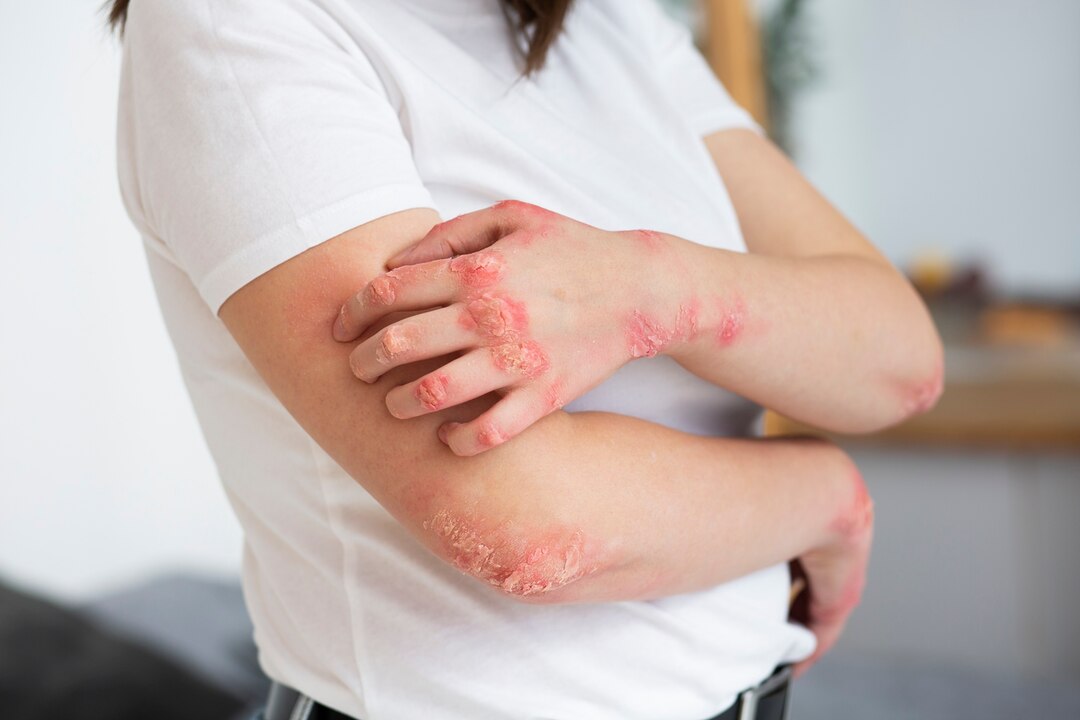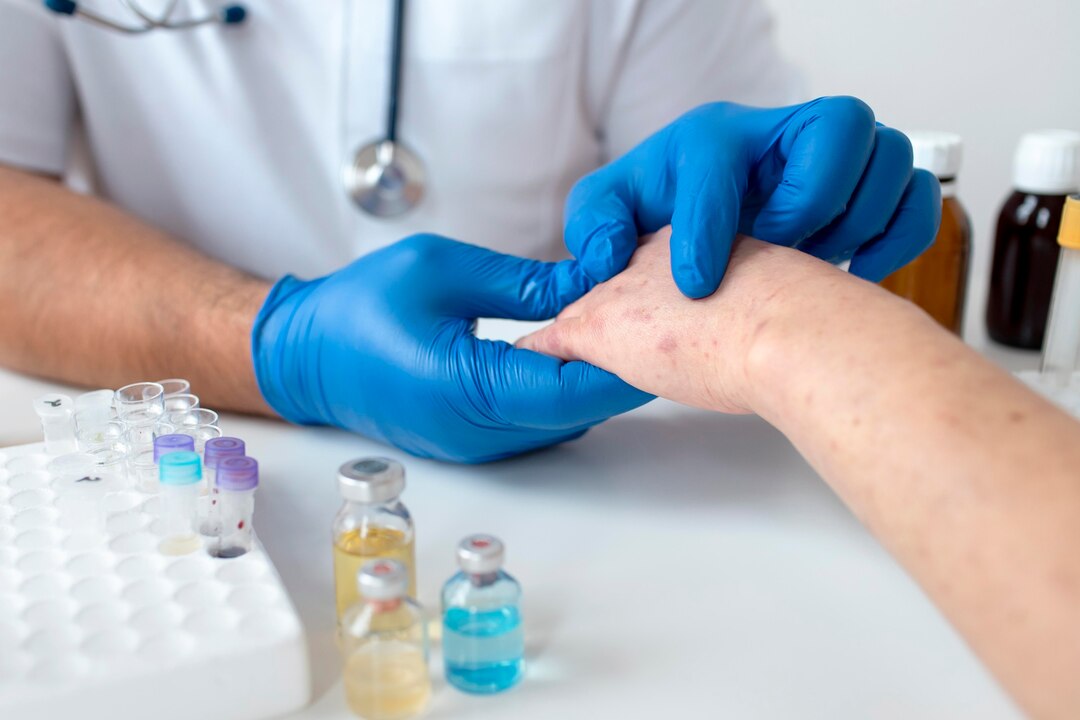Psoriasis Skin Condition

Psoriasis is a common, none contagious skin condition that can affect individuals of all demographics.
Psoriasis is a chronic autoimmune skin condition that causes an overproduction of skin cells on the surface of the body.
Normally, skin cells form and shed gradually in a monthly cycle. However, in psoriasis, this process speeds up dramatically, taking only days or a few weeks. This rapid cellular turnover leads to a buildup of dead skin cells on the skin’s surface, forming the characteristic symptoms.
Symptoms Of Psoriasis
The most common symptom is the appearance of raised, red, scaly patches on the surface of the skin. These patches can be itchy and uncomfortable. They can appear anywhere on the body, but they most commonly affect the elbows, knees, scalp, lower back and face.
Although psoriasis is not a fatal skin condition, psoriasis skin can be a challenge to manage, with redness and patches often affecting one’s self-confidence. Psoriasis can be a source of significant psychological distress for many individuals.
Psoriasis Triggers
Psoriasis can be triggered by various factors. While the exact cause of psoriasis remains unknown, identifying and managing these triggers can help reduce the frequency and severity of flare-ups.
Several factors can trigger psoriasis flare-ups, including:
Cold Environments
Decreased temperatures from the environment such as cold, dry weather can contribute to symptoms.
Infections
Infections, particularly strep throat, can trigger psoriasis flare-ups.
Skin Injury
Cuts, scrapes, or sunburn can lead to new psoriasis patches in the affected area. This is known as the Koebner phenomenon.
Skin Care Products
Harsh chemicals or irritating ingredients in skincare products can be problematic for active psoriasis.
Skin Microbiome Imbalance
The use of soaps and detergents can strip and disturb the carefully balanced skin microbiome, thus can contribute to psoriasis symptoms.
Genetics
Psoriasis is more common in people with a family history of the condition.
Medications
The use of certain medications may also influence the development and progression of psoriasis to include; beta-blockers, lithium, antimalarial drugs and some antibiotics may trigger flare-ups.
Psychological Stress
Emotional stress can worsen psoriasis symptoms.
Mechanical Trauma
Individuals with a predisposition to psoriasis may experience more symptoms with the application of harsh scrubbing on the skin.
Diet
While not a direct cause, diet can significantly influence psoriasis symptoms. Certain foods can trigger inflammation in the body, which can worsen psoriasis symptoms. Being overweight or obese is linked to more severe psoriasis. Eating a poor diet can lead to vitamin and mineral deficiencies, potentially impacting ones health and psoriasis symptoms.
Foods that might trigger psoriasis flares:
- Red meat
- Dairy
- Processed foods
- Foods high in saturated and unhealthy fats
It is important to recognise that not everyone with psoriasis will react to food in the same way. However, following a healthy, varied diet can safeguard an individual to a healthy gut microbiome, overall better health, to include skin health.
Lifestyle
Sleep deprivation, too much alcohol consumption, recreational drugs, smoking, lots of air travel, and a generally poor lifestyle can affect the equilibrium of the body, which can contribute to psoriasis symptoms.
It’s important to note that not everyone with psoriasis will experience the same triggers. Identifying your personal triggers can take time and careful observation. Keeping a psoriasis diary can help you track potential triggers and patterns.
Psoriasis Treatments
If you think you might have psoriasis, it’s important to see a doctor for diagnosis and treatment. Early diagnosis and treatment can help prevent flare-ups and improve your overall well-being.
If you’re struggling with psoriasis, consulting with a doctor can provide valuable guidance on managing your condition and identifying your specific triggers.
For optimum results psoriasis is best treated holistically, that is treating the person as a whole rather than treating the specific condition in isolation.
The holistic management of psoriasis, regardless of its severity, should commence with a comprehensive consultation. This appointment should encompass discussions about the nature of the skin conditions, proper skincare practices, an overview of lifestyle and diet, with realistic treatment expectations.
Seek a professional, experienced holistic practitioner to carry out such an assessment. They can provide guidance for the treatment most suited to your specific needs.
A proactive approach can lead to fewer symptoms with a calmer and clearer skin over time.
Long-term maintenance treatment is often necessary because most psoriasis treatments are considered suppressive and not curative, particularly if an individual with a predisposition to psoriasis.
Responses to a treatment may vary from each individual. Therefore, it may be necessary to make adjustments over time to the treatment regimen, to optimise both the tolerability and efficacy of the treatment undertaken.
There are a number of treatments available for psoriasis, depending on the severity of the skin condition. The right treatment plan can effectively manage symptoms and prevent flare-ups.
While there is no cure for psoriasis, there are effective treatments that can help manage symptoms and improve quality of life. These treatments can include:
Topical medications
Specific creams, ointments, and lotions applied directly to the skin to reduce inflammation and scaling.
Medications
Oral or injected medications that help regulate the immune system and reduce inflammation.
Holistic Medicine
Holistic medicine such as Acupuncture, Herbal Medicine, Naturopathy and Homeopathy can help regulate the body’s systems, reduce inflammation and improve symptoms.
UV Light Therapy
Ultraviolet (UV) light exposure can help slow the growth of skin cells.
LED Light Therapy
LED light exposure can help slow the growth of skin cells.
Oxygen Therapy
This treatment can provide a cooling, healing effect on the skin.
Wellness Therapies
Relaxing wellness therapies such as Yoga and Holistic Massage help to reduce stress and regulate the nervous system which can have a profound effect on wellness and skin conditions.
With over 35+ years, The Emporium Treatment Clinic senior aesthetician and wellness advocate Angela is able to help you to take the appropriate measures, or direct you to one of our elite holistic practitioners. So why not pop in and visit us in Marylebone, London, if you feel you need a consultation.
Here’s more tips from Angela on the topic to minimise psoriasis:
1. Avoid harsh skin care products.
2. Seek a cleanser with a similar PH to the skin (4.5-5.5).
3. Wash your skin every day with a gentle wash.
4. Use oil-free products such as gels and fluids.
5. Apply products that contain vitamin C, hyaluronic acid and chamomile to calm the skin.
6. Limit your intake of processed foods, sugary foods and drinks that contribute to inflammation in the body and skin.
7. Eat a nutritious, varied and balanced diet to support overall health and the immune system.
8. Manage stress to regulate the nervous system and support the immune system.
9. Seek a healthy lifestyle. Avoid recreational drugs and smoking.
10. Supplement your health and skin with Antioxidants, Vitamin E, Zinc, and Vitamin D, to name but a few. Emporium Treatment Clinic experts highly recommend the ‘Viridian’ brand for quality and purity.

Expert Advisors
Here at Emporium Treatment Clinic in Marylebone, we provide expert advice in skincare for home use or professional in-clinic treatments.
In addition to the Emporium Treatment Clinic core practice, selected elite independent practitioners provide an array of holistic health, nutrition, wellness and relaxation services and treatments.
Our team of experts combine a wealth of knowledge, and have collaborated to provide the ultimate synergy of diverse strategies to provide you not only with a clearer skin but, most importantly, to nurture health and well-being from within.
SHOP FOR VIRIDIAN HEALTH SUPPLEMENTS HERE
Need help to decide which supplements are best for you?
Contact Angela For A Free Chat
07930 661971
Why not look at our latest treatment offers here!
Author: Angela Taffinder the founder of Emporium Treatment Clinic. A practising Aesthetician for 35+ years, holistic and wellbeing advocate and yoga instructor. The creator of Yoga & Vitality.
Skin Care & Body Analysis & Consultation
Available at Emporium Treatment Clinic provided by Angela Taffinder the founder of Emporium Treatment Clinic and practising Aesthetician for 35+ years
Contact Us here
Health & Wellness Analysis & Consultation
Available at Emporium Treatment Clinic provided by highly qualified, experienced Doctors, Nutritionist, Holistic Medicine practitioners and Wellness experts.
Contact Us here
